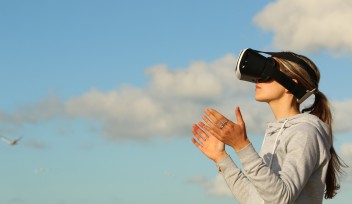Exploring the human experience of social distancing

As the COVID-19 pandemic has spread, people around the world have experienced lockdowns and severe disruptions to their daily life. The fabric of normal society has been torn, with restrictions on hugging friends and family, or even talking face-to-face.
In a recent perspective piece published in The Lancet, Professor Tom Froese from the Okinawa Institute of Science and Technology Graduate University and his colleagues, Professor Havi Carel from the University of Bristol and Professor Matthew Ratcliffe from the University of York, share their unique philosophical insight into how people have experienced these restrictions.
These measures to contain the coronavirus were initially grouped under the catch-all phrase of social distancing. Yet by the end of March, the World Health Organization (WHO) started promoting a new term – physical distancing – reasoning that while people should avoid being physically present with each other, it was more important than ever to remain socially connected. But social distancing has stuck within the public psyche, and for Prof. Froese, who leads the OIST Embodied Cognitive Science Unit, there’s a clear and instinctual reason why.
“There is a certain richness about interactions where you are physically present that I think is inherent to having a true social experience,” said Prof. Froese. “The crucial point is the embodied presence of other people. The way we interact is multimodal – combining touch, smell, sound and vision – and these ways of interacting can never be replicated online.”

In embodied cognition, interactions aren’t just inputs of information into individual minds, but are an integral part of the mind, which extends beyond the brain into the environment. Writing in The Lancet, Froese and his colleagues discuss the importance of these social interactions, both strong ties with loved ones and weak connections with strangers and neighbors, and how their loss has impacted us all.
“Our lives are saturated with social relationships at all times,” Prof. Froese said. “Normally we don’t see them, we take them for granted. What this pandemic has done is made us painfully aware of all the ways we relate to others in our everyday lives and how difficult it is to do without that.”
The idea of embodied cognition has existed at the fringes of mainstream thinking for decades but has recently risen in prominence, as modern technology allows better insight into the mind. Scientists can now scan the brains of two humans at the same time and have shown that our very brain waves can synchronize with each other during social engagement, along with heart rate and breathing rate.
“When we experience true social interaction, our bodies resonate with each other – we are literally on the same wavelength,” said Prof. Froese.
Many studies have suggested that these synced brain waves alter our conscious thoughts and emotions, indicating that the very nature of human experience at its core is profoundly more social than previously assumed. Prof. Froese believes this could explain why social distancing has been so hard, and why it has such negative effects on our mental wellbeing.
In The Lancet, Prof. Froese and his colleagues introduce a survey which draws on phenomenology, the philosophical study of human experience and consciousness. They aim to investigate how social distancing measures have changed how people experience themselves, others and the world around them, by letting people across the world share their own stories and reflect on their own experiences in a structured way.

“One of the biggest takeaways we’ve seen is how people have reacted to online video-chat technologies, which have actually become quite taxing,” said Prof. Froese. “It makes it clear that while online technology is a useful tool, it should not be seen as a replacement for direct human contact.”
Prof. Froese is also interested to see whether the impacts of social distancing are experienced differently in different cultures.
“When we discuss the experiences and impacts on people in The Lancet article, it’s written from a personal, and hence euro-centric point of view,” he said. “But we want to examine whether the impacts are the same for people who grew up in more collective societies or whose culture is more extroverted.”
“Ultimately, I think this survey could provide valuable insight into a more personal dimension of the pandemic, including people’s mental health,” said Prof. Froese. “If you understand better how people are impacted and what’s most important or most challenging, it can help guide future policies which can make social distancing and quarantining more manageable and effective.”
Research Unit
For press enquiries:
Press Inquiry Form
















